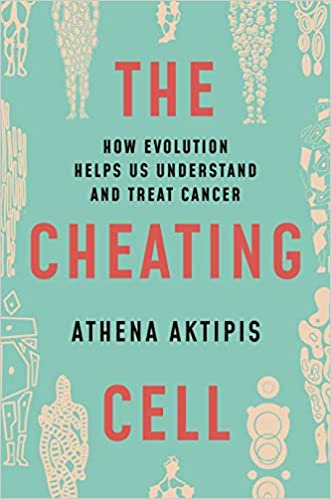#MathOnco Issue 127: collective invasion, drug-tolerable phenotypes, circulating tumor DNA, deterministic coexistence, and more.
This week in
Math Oncology
Aug 20, 2020 ~ Issue 127
From the editor
Dear readers,
It's been a great week of attending all the great Math Onco talks at the SMB2020 meeting! But rest assured, the publications & preprints continue to roll in.
Today's issue includes the following topics: collective invasion, drug-tolerable phenotypes, circulating tumor DNA, deterministic coexistence, and more.
Enjoy,
-Jeffrey West

#MathOnco Publications
Mathematical Modeling of MPNs Offers Understanding and Decision Support for Personalized Treatment
Authors: Johnny T. Ottesen, Rasmus K. Pedersen, Marc J. B. Dam, Trine A. Knudsen, Vibe Skov, Lasse Kjær, Morten Andersen
Collective invasion of glioma cells through OCT1 signalling and interaction with reactive astrocytes after surgery
Authors: Yangjin Kim, Donggu Lee, Sean Lawler
Drug-Tolerant Idling Melanoma Cells Exhibit Theory-Predicted Metabolic Low-Low Phenotype
Authors: Dongya Jia, B. Bishal Paudel, Corey E. Hayford, Keisha N. Hardeman, Herbert Levine, José N. Onuchic, Vito Quaranta
Unification of aggregate growth models by emergence from cellular and intracellular mechanisms
Authors: T. J. Sego, James A. Glazier, Andres Tovar
Cancer modeling: From mechanistic to data-driven approaches, and from fundamental insights to clinical applications
Authors: Sophie Bekisz, Liesbet Geris
Game Theory Cancer Models of Cancer Cell-Stromal Cell Dynamics using Interacting Particle Systems
Authors: Yinan Zheng, Yusha Sun, Gonzalo Torga, Kenneth Pienta, Robert Austin
Prognostic and predictive impact of circulating tumor DNA in patients with advanced cancers treated with immune checkpoint blockade
Authors: Qu Zhang, Jia Luo, Song Wu, Han Si, ..., Jamie E. Chaft, Todd Hembrough, J. Carl Barrett, Matthew D. Hellmann

#MathOnco Preprints
Does deterministic coexistence theory matter in a finite world?
Authors: Sebastian Schreiber, Jonathan M. Levine, Oscar Godoy, Nathan Kraft, Simon Hart
Mathematical Modeling of Multiple Pathways in Colorectal Carcinogenesis using Dynamical Systems with Kronecker Structure
Authors: Saskia Haupt, Alexander Zeilmann, Aysel Ahadova, Magnus von Knebel Doeberitz, Matthias Kloor, Vincent Heuveline

Thriving and Evolving During the Pandemic
The Mathematical Oncology Blog
- Andrea Hawkins-Daarud -
"While the tentacles of Covid-19 are everywhere, those of us working in computational research seem to have thankfully been mostly shielded from unemployment due to social distancing expectations. (There is definitely more than one joke about an enrichment of the anti-social phenotype enrichment amongst computational scientists!) But seriously, intermittent remote working is actually a part of normal routine in our field as we work with coworkers and collaborators to design studies, debug code, draft grants, and finalize papers. And yet, the mandate to indefinitely discontinue travel and to work exclusively from home has been, to put it mildly, quite jarring. And I say that even as someone who has worked exclusively remotely for the last five years."
Special Issue:
"Mathematical Models of Cellular Immunotherapies in Cancer"
Announcement:In this Special Issue, we plan to address cellular therapies from a mathematical and computational modeling perspective. Mathematical modeling has the potential to help in finding optimal administration protocols, provide a deeper understanding of the mechanisms and dynamics, help in the design of new clinical trials, and more. Despite the immense potential of these treatments, applied mathematicians and computational modelers have started to study these processes only very recently.
Guest Editors:
Víctor Pérez-García, Lisette de Pillis, Philipp Altrock, Russell Rockne
Virtual Seminars
1. Mathematical and Computational Biology Seminar Series
University of Massachusetts Amherst
Next talk: James Glazier
"Multiscale multicellular modeling of tissue function and disease using CompuCell3D: A simplified computer simulation of acute primary viral infection and immune response in an epithelial tissue"
Aug. 24, 2020 at 11:00am EST

#MathOnco - Book of the month
The Cheating Cell
Athena Aktipis: "When we think of the forces driving cancer, we don’t necessarily think of evolution. But evolution and cancer are closely linked, for the historical processes that created life also created cancer. The Cheating Cell delves into this extraordinary relationship, and shows that by understanding cancer’s evolutionary origins, researchers can come up with more effective, revolutionary treatments."

Jobs
Postdoctoral Research Position in Computational Immunology (Sylvain Cussat-Blanc)
Postdoc Position - TKI treatments in lung cancer (David Basanta)
Research Associate, Postdoc, and Research Faculty positions – Mathematical Oncology (Russ Rockne)
Systems Biology Modeler Positions in Biopharma Consulting Company (Helen Moore)
Computational Approaches to Breast Cancer Evolution - Postdoc (Marc Ryser)
Math/statistical models of stem cell lineage dynamics and cancer genomics - Postdoc (Adam MacLean)
Postdoctoral Research Position in Computational Oncology (Tom Yankeelov)
Do you see something we missed? Reply to this email to send us an idea for next week's issue.
The #MathOnco newsletter is maintained by Jeffrey West.
If you were forwarded this email, subscribe for free here to get it delivered every week.



